◄ 1963 ►
Jan | Feb | Mar | Apr | May | Jun | Jul | Aug | Sep | Oct | Nov | Dec
| January | ► | ▲ | ||||
|---|---|---|---|---|---|---|
| 1 | 2 | 3 | 4 | 5 | ||
| 6 | 7 | 8 | 9 | 10 | 11 | 12 |
| 13 | 14 | 15 | 16 | 17 | 18 | 19 |
| 20 | 21 | 22 | 23 | 24 | 25 | 26 |
| 27 | 28 | 29 | 30 | 31 | ||
![]()
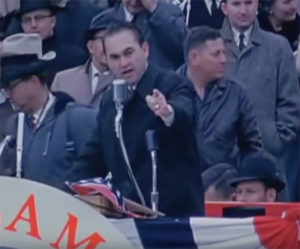 Jan 14: George Wallace becomes governor of Alabama. In his inaugural speech, he proclaims, “In the name of the greatest people that have ever trod this earth, I draw the line in the dust and toss the gauntlet before the feet of tyranny, and I say ‘segregation now, segregation tomorrow, and segregation forever.’ … Let us send this message back to Washington…, that from this day we are standing up, and the heel of tyranny does not fit the neck of an upright man.”
Jan 14: George Wallace becomes governor of Alabama. In his inaugural speech, he proclaims, “In the name of the greatest people that have ever trod this earth, I draw the line in the dust and toss the gauntlet before the feet of tyranny, and I say ‘segregation now, segregation tomorrow, and segregation forever.’ … Let us send this message back to Washington…, that from this day we are standing up, and the heel of tyranny does not fit the neck of an upright man.”
![]() Jan 14: Sylvia Plath’s novel, The Bell Jar, is published.
Jan 14: Sylvia Plath’s novel, The Bell Jar, is published.
![]() Jan 23: The Sino-Indian War formally ends when India’s Parliament approves the terms for peace with China.
Jan 23: The Sino-Indian War formally ends when India’s Parliament approves the terms for peace with China.
![]()
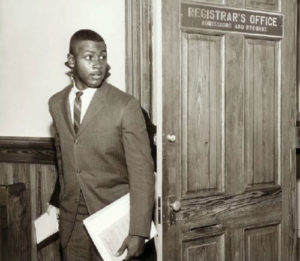 Jan 28: Harvey Gantt registers at Clemson University in South Carolina, the last U.S. state to hold out against racial integration of its public schools at all levels. His enrollment takes place with no major problems. State and university officials, having watched the turmoil that had taken place at the University of Mississippi the previous fall, worked behind the scene to ensure that Gantt’s enrollment goes smoothly.
Jan 28: Harvey Gantt registers at Clemson University in South Carolina, the last U.S. state to hold out against racial integration of its public schools at all levels. His enrollment takes place with no major problems. State and university officials, having watched the turmoil that had taken place at the University of Mississippi the previous fall, worked behind the scene to ensure that Gantt’s enrollment goes smoothly.
| ◄ | February | ► | ▲ | |||
|---|---|---|---|---|---|---|
| 1 | 2 | |||||
| 3 | 4 | 5 | 6 | 7 | 8 | 9 |
| 10 | 11 | 12 | 13 | 14 | 15 | 15 |
| 17 | 18 | 19 | 20 | 21 | 22 | 23 |
| 24 | 25 | 26 | 27 | 28 | ||
![]() Feb 5: President John F. Kennedy imposes a travel, financial and commercial transaction ban against Cuba.
Feb 5: President John F. Kennedy imposes a travel, financial and commercial transaction ban against Cuba.
![]() Feb 11: Poet Sylvia Plath commits suicide in London by inhaling carbon monoxide fumes from her gas oven.
Feb 11: Poet Sylvia Plath commits suicide in London by inhaling carbon monoxide fumes from her gas oven.
![]() Feb 14: Federico Fellini’s film 8½ is released.
Feb 14: Federico Fellini’s film 8½ is released.
![]()
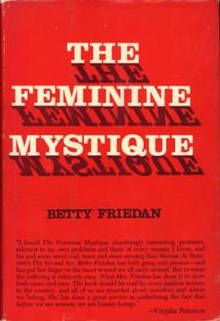 Feb 19: Betty Friedan’s The Feminine Mystique is published. It’s regarded as one of the most influential works of non-fiction of the 20th century and is credited with sparking the second wave of feminism in the United States.
Feb 19: Betty Friedan’s The Feminine Mystique is published. It’s regarded as one of the most influential works of non-fiction of the 20th century and is credited with sparking the second wave of feminism in the United States.
![]() Feb 21: Telstar 1, the communications satellite which had facilitated the first international television broadcasts between the United States and Europe on July 23, 1962, stops functioning. The satellite was launched on July 10, just one day after the U.S. detonated a 1.4 megaton hydrogen bomb in outer space, 248 miles above Johnston Atoll in the Pacific. The increased radiation in the Van Allen radiation belt caused the satellite’s transponders to deteriorate.
Feb 21: Telstar 1, the communications satellite which had facilitated the first international television broadcasts between the United States and Europe on July 23, 1962, stops functioning. The satellite was launched on July 10, just one day after the U.S. detonated a 1.4 megaton hydrogen bomb in outer space, 248 miles above Johnston Atoll in the Pacific. The increased radiation in the Van Allen radiation belt caused the satellite’s transponders to deteriorate.
| ◄ | March | ► | ▲ | |||
|---|---|---|---|---|---|---|
| 1 | 2 | |||||
| 3 | 4 | 5 | 6 | 7 | 8 | 9 |
| 10 | 11 | 12 | 13 | 14 | 15 | 15 |
| 17 | 18 | 19 | 20 | 21 | 22 | 23 |
| 24 | 25 | 26 | 27 | 28 | 29 | 30 |
| 31 | ||||||
![]()
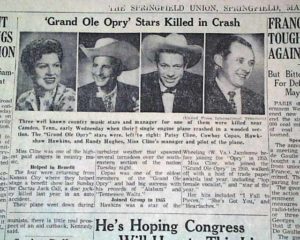 Mar 5: Country music star Patsy Cline is killed in a plane crash in Camden, Tennessee. She was flying from a benefit performance in Kansas City. Also killed were country stars Hawkshaw Hawkins and Cowboy Copas.
Mar 5: Country music star Patsy Cline is killed in a plane crash in Camden, Tennessee. She was flying from a benefit performance in Kansas City. Also killed were country stars Hawkshaw Hawkins and Cowboy Copas.
![]() Mar 21: The federal penitentiary on Alcatraz is closed because it costs twice as much to operate than other prisons in the federal systems.
Mar 21: The federal penitentiary on Alcatraz is closed because it costs twice as much to operate than other prisons in the federal systems.
![]() Mar 21: The U.S. Food and Drug Administration gives its approval for the first vaccine against the measles.
Mar 21: The U.S. Food and Drug Administration gives its approval for the first vaccine against the measles.
![]() Mar 22: The Beatle’s first album, Please Please Me is released in the UK.
Mar 22: The Beatle’s first album, Please Please Me is released in the UK.
![]()
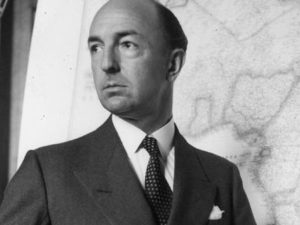 Mar 22: A day earlier, British Labour MP George Wigg had asked the government to hold hearings on whether Secretary of War John Profumo had any inappropriate connections with Christine Keeler, a missing 20-year-old exotic dancer. In response to the previous day’s question, Profumo tells the House of Commons, “there was no impropriety whatsoever in my acquaintanceship with Miss Keeler.” He then adds, “I shall not hesitate to issue writs for libel and slander if scandalous allegations are made or repeated outside the House.” This is the start of what becomes known as the “Profumo Affair,” a political scandal that will help to bring down the Conservative government in October.
Mar 22: A day earlier, British Labour MP George Wigg had asked the government to hold hearings on whether Secretary of War John Profumo had any inappropriate connections with Christine Keeler, a missing 20-year-old exotic dancer. In response to the previous day’s question, Profumo tells the House of Commons, “there was no impropriety whatsoever in my acquaintanceship with Miss Keeler.” He then adds, “I shall not hesitate to issue writs for libel and slander if scandalous allegations are made or repeated outside the House.” This is the start of what becomes known as the “Profumo Affair,” a political scandal that will help to bring down the Conservative government in October.
![]() Mar 28: The Alfred Hitchcock thriller The Birds is released.
Mar 28: The Alfred Hitchcock thriller The Birds is released.
![]() Mar 30: The Chiffons’ single “He’s So Fine” begins its four week run at the top of the charts.
Mar 30: The Chiffons’ single “He’s So Fine” begins its four week run at the top of the charts.
![]() Mar 31: The 114-day New York City newspaper strike ends.
Mar 31: The 114-day New York City newspaper strike ends.
| ◄ | April | ► | ▲ | |||
|---|---|---|---|---|---|---|
| 1 | 2 | 3 | 4 | 5 | 6 | |
| 7 | 8 | 9 | 10 | 11 | 12 | 13 |
| 14 | 15 | 16 | 17 | 18 | 19 | 20 |
| 21 | 22 | 23 | 24 | 25 | 26 | 27 |
| 28 | 29 | 30 | ||||
![]() Apr 1: The long-running soap opera General Hospital debuts on ABC.
Apr 1: The long-running soap opera General Hospital debuts on ABC.
![]()
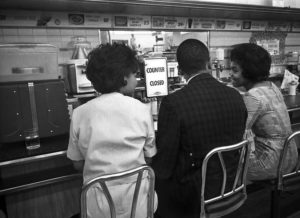 Apr 3: The Birmingham Campaign begins with the release of the “Birmingham Manifesto,” calling for desegregation of the city’s lunch counters, restrooms and drinking fountains in downtown stores, establishment of fair hiring practices in Birmingham businesses and city employees, re-opening of parks and swimming pools, and the establishment of a biracial committee to oversee other aspects of desegregation in the city. The Manifesto is accompanied with the first organized sit-ins at Birmingham’s downtown lunch counters, in which twenty people are arrested. The date was selected to coincide with the local premiere of the film To Kill a Mockingbird at the Melba Theater downtown. At the time the Birmingham campaign begins, the city is widely regarded as the most segregated city in the South.
Apr 3: The Birmingham Campaign begins with the release of the “Birmingham Manifesto,” calling for desegregation of the city’s lunch counters, restrooms and drinking fountains in downtown stores, establishment of fair hiring practices in Birmingham businesses and city employees, re-opening of parks and swimming pools, and the establishment of a biracial committee to oversee other aspects of desegregation in the city. The Manifesto is accompanied with the first organized sit-ins at Birmingham’s downtown lunch counters, in which twenty people are arrested. The date was selected to coincide with the local premiere of the film To Kill a Mockingbird at the Melba Theater downtown. At the time the Birmingham campaign begins, the city is widely regarded as the most segregated city in the South.
![]() Apr 5: The Soviet Union and the U.S. agree to establish a Moscow-Washington hotline so the leaders could communicate directly with each other and avoid potential conflicts.
Apr 5: The Soviet Union and the U.S. agree to establish a Moscow-Washington hotline so the leaders could communicate directly with each other and avoid potential conflicts.
![]() Apr 6: Birmingham civil rights activists lead a march to Birmingham City Hall. Police intercept the march before it reaches its destination and arrest thirty marchers.
Apr 6: Birmingham civil rights activists lead a march to Birmingham City Hall. Police intercept the march before it reaches its destination and arrest thirty marchers.
![]() Apr 7: Birmingham-area black ministers lead a Palm Sunday march to protest the arrests from the day before. When the 2,000-strong march is stopped by police, protesters kneel in prayer. Police arrest 26 marchers and use police dogs to disperse the crowd.
Apr 7: Birmingham-area black ministers lead a Palm Sunday march to protest the arrests from the day before. When the 2,000-strong march is stopped by police, protesters kneel in prayer. Police arrest 26 marchers and use police dogs to disperse the crowd.
![]() Apr 10: U.S. nuclear submarine Thresher sinks 220 miles off of Cape Cod. All 129 persons on board are killed.
Apr 10: U.S. nuclear submarine Thresher sinks 220 miles off of Cape Cod. All 129 persons on board are killed.
![]()
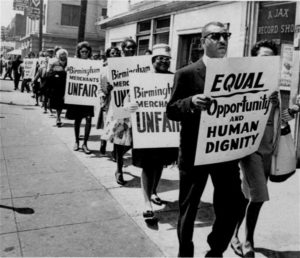 Apr 10: As protests and arrests continue in Birmingham, most of the lunch counters downtown have closed. Notorious Public Safety Commissioner “Bull” Conner gets a Circuit Court Judge to issue an injunction against “boycotting, trespassing, parading, picketing, sit-ins, kneel-ins, wade-ins, and inciting or encouraging such acts.” Connor also raises the bail for those arrested from $200-$300 ($1,600-$2,400 today) to $1,500 ($12,200 today).
Apr 10: As protests and arrests continue in Birmingham, most of the lunch counters downtown have closed. Notorious Public Safety Commissioner “Bull” Conner gets a Circuit Court Judge to issue an injunction against “boycotting, trespassing, parading, picketing, sit-ins, kneel-ins, wade-ins, and inciting or encouraging such acts.” Connor also raises the bail for those arrested from $200-$300 ($1,600-$2,400 today) to $1,500 ($12,200 today).
![]()
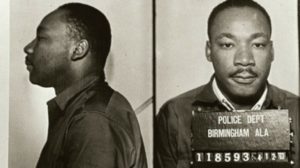 Apr 12: Martin Luther King, Jr., Ralph Abernathy and Fred Shuttlesworth lead a Good Friday march toward downtown. Police block their path and arrest the march leaders for “parading without a permit.”
Apr 12: Martin Luther King, Jr., Ralph Abernathy and Fred Shuttlesworth lead a Good Friday march toward downtown. Police block their path and arrest the march leaders for “parading without a permit.”
![]()
 Apr 16: Martin Luther King, Jr., writes his “Letter from Birmingham Jail,” in which he defends the strategy of nonviolent resistance and says that people have a moral responsibility to break unjust laws. Responding to criticisms that King is an “outside agitator,” King writes, “injustice anywhere is a threat to justice everywhere.” The letter will become one of the foundational texts of the civil rights movement.
Apr 16: Martin Luther King, Jr., writes his “Letter from Birmingham Jail,” in which he defends the strategy of nonviolent resistance and says that people have a moral responsibility to break unjust laws. Responding to criticisms that King is an “outside agitator,” King writes, “injustice anywhere is a threat to justice everywhere.” The letter will become one of the foundational texts of the civil rights movement.
![]() Apr 20: Martin Luther King, Jr., is bailed out of jail with money sent by singer Harry Belafonte. Meanwhile sit-ins, marches and arrests have continued uninterrupted.
Apr 20: Martin Luther King, Jr., is bailed out of jail with money sent by singer Harry Belafonte. Meanwhile sit-ins, marches and arrests have continued uninterrupted.
| ◄ | May | ► | ▲ | |||
|---|---|---|---|---|---|---|
| 1 | 2 | 3 | 4 | |||
| 5 | 6 | 7 | 8 | 9 | 10 | 11 |
| 12 | 13 | 14 | 15 | 16 | 17 | 18 |
| 19 | 20 | 21 | 22 | 23 | 24 | 25 |
| 26 | 27 | 28 | 29 | 30 | 31 | |
![]() May 1: Coca-Cola introduces its first diet cola, Tab.
May 1: Coca-Cola introduces its first diet cola, Tab.
![]() May 2: In Birmingham, Alabama, the Children’s Crusade begins when thousands of high school students skip school and converge at city hall to protest Bull Connor and his police actions. Nearly a thousand demonstrators are arrested.
May 2: In Birmingham, Alabama, the Children’s Crusade begins when thousands of high school students skip school and converge at city hall to protest Bull Connor and his police actions. Nearly a thousand demonstrators are arrested.
![]()
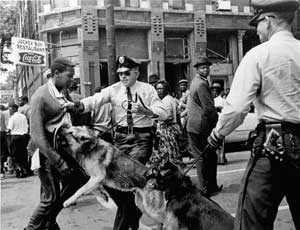 May 4: With Birmingham’s jails already full, thousands more demonstrations begin filing out of the 16th Street Baptist Church for another march downtown. Public Safety Commissioner Bull Connor orders the use of police dogs and fire hoses to break up the march. Film of the police action airs on television news broadcasts around the world and shocks the nation. With the jails now overcrowded, hundreds of students are locked up at Fair Park.
May 4: With Birmingham’s jails already full, thousands more demonstrations begin filing out of the 16th Street Baptist Church for another march downtown. Public Safety Commissioner Bull Connor orders the use of police dogs and fire hoses to break up the march. Film of the police action airs on television news broadcasts around the world and shocks the nation. With the jails now overcrowded, hundreds of students are locked up at Fair Park.
![]()
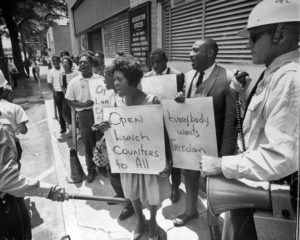 May 6: Comedian Dick Gregory leads 800 young marchers to Birmingham City Hall. They are arrested before reaching their destination .With the jails still full, police send demonstrators to county jails and the Alabama State Fairgrounds.
May 6: Comedian Dick Gregory leads 800 young marchers to Birmingham City Hall. They are arrested before reaching their destination .With the jails still full, police send demonstrators to county jails and the Alabama State Fairgrounds.
![]()
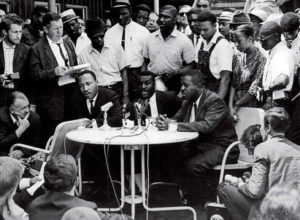 May 10: The Birmingham Truce is announced by Martin Luther King, Jr., Fred Shuttlesworth and Ralph Abernathy at the A.G. Gaston Motel, the city’s preeminent black-owned motel that doubles as an unofficial headquarters for the Birmingham Campaign. The Truce was worked out between black leaders, the business community and federal negotiators sent by President Kennedy. It calls for the removal of segregating signs, plans to desegregate lunch counters, the release of arrested protestors, an employment program for blacks, and a biracial committee to monitor the agreement’s progress. Bull Connor and Gov. George Wallace denounce the truce.
May 10: The Birmingham Truce is announced by Martin Luther King, Jr., Fred Shuttlesworth and Ralph Abernathy at the A.G. Gaston Motel, the city’s preeminent black-owned motel that doubles as an unofficial headquarters for the Birmingham Campaign. The Truce was worked out between black leaders, the business community and federal negotiators sent by President Kennedy. It calls for the removal of segregating signs, plans to desegregate lunch counters, the release of arrested protestors, an employment program for blacks, and a biracial committee to monitor the agreement’s progress. Bull Connor and Gov. George Wallace denounce the truce.
![]()
 May 11: The A.G. Gaston Motel and the home of Birmingham civil rights leader Rev. A.D. King, Martin Luther King’s brother, are firebombed. Riots spread across the city.
May 11: The A.G. Gaston Motel and the home of Birmingham civil rights leader Rev. A.D. King, Martin Luther King’s brother, are firebombed. Riots spread across the city.
![]() May 12: Bob Dylan backs out of his scheduled national debut on The Ed Sullivan Show when CBS censors refuse to allow him to sing “Talkin’ John Birch Paranoid Blues.”
May 12: Bob Dylan backs out of his scheduled national debut on The Ed Sullivan Show when CBS censors refuse to allow him to sing “Talkin’ John Birch Paranoid Blues.”
![]() May 13: After two days of rioting in Birmingham, three thousand federal troops are sent to restore order. This is despite Gov. George Wallace telling President Kennedy that state and local forces can handle the situation.
May 13: After two days of rioting in Birmingham, three thousand federal troops are sent to restore order. This is despite Gov. George Wallace telling President Kennedy that state and local forces can handle the situation.
![]() May 20: The Birmingham Board of Education votes to expel all 1,81 students arrested for demonstrating. A federal judge will reverse the expulsion two days later.
May 20: The Birmingham Board of Education votes to expel all 1,81 students arrested for demonstrating. A federal judge will reverse the expulsion two days later.
![]() May 27: Bob Dylan’s second studio album, The Freewheelin’ Bob Dylan is released, along with its opening song, “Blowin’ In the Wind.”
May 27: Bob Dylan’s second studio album, The Freewheelin’ Bob Dylan is released, along with its opening song, “Blowin’ In the Wind.”
![]()
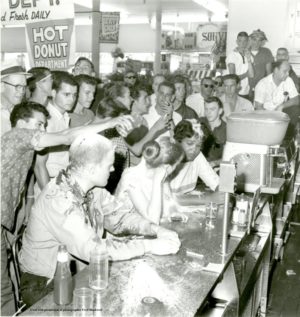 May 28: Four college students — Pearlena Lewis, Anne Moody, Trumpauer Mulholland, and Memphis Norman — along with their white sociology professor, John Salter, all from Tougaloo College, sit down at a segregated Woolworth’s lunch counter in Jackson, Mississippi. For the next three hours, they endure taunts and threats from a growing and increasingly agitated mob pouring flour, salt, sugar, mustard and drinks on them, and even burning cigarettes on their skin. At one point, Norman is pulled off of his stool, thrown to the grown and kicked in the head. Two other students are pulled from their seats, but they are able to fight their way back. Jackson police provide no protection. This comes three years after the first sit-ins occurred in Greensboro, North Carolina.
May 28: Four college students — Pearlena Lewis, Anne Moody, Trumpauer Mulholland, and Memphis Norman — along with their white sociology professor, John Salter, all from Tougaloo College, sit down at a segregated Woolworth’s lunch counter in Jackson, Mississippi. For the next three hours, they endure taunts and threats from a growing and increasingly agitated mob pouring flour, salt, sugar, mustard and drinks on them, and even burning cigarettes on their skin. At one point, Norman is pulled off of his stool, thrown to the grown and kicked in the head. Two other students are pulled from their seats, but they are able to fight their way back. Jackson police provide no protection. This comes three years after the first sit-ins occurred in Greensboro, North Carolina.
| ◄ | June | ► | ▲ | |||
|---|---|---|---|---|---|---|
| 1 | ||||||
| 2 | 3 | 4 | 5 | 6 | 7 | 8 |
| 9 | 10 | 11 | 12 | 13 | 14 | 15 |
| 16 | 17 | 18 | 19 | 20 | 21 | 22 |
| 23 | 24 | 25 | 26 | 27 | 28 | 29 |
| 30 | ||||||
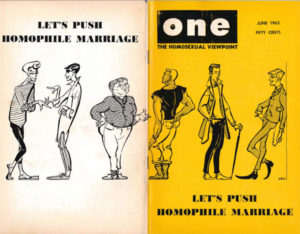 June: ONE magazine publishes “Let’s Push Homophile Marriage”. ONE magazine dared to imagine the possibility of “homophile marriage” in its June 1963 issue. Randy Lloyd, the article’s author, didn’t really touch on the legal or religious elements of same-sex marriage. Instead, he was writing about just the idea of two people forming a relationship and calling it marriage. That idea, limited as it was, was quite radical in the gay community. In fact, there was a very large contingent of gay men and women who felt that one of the only advantages of being gay was that you weren’t expected to settle down and get married. Not only that, the heightened visibility from straight society of same-sex couples setting up a home together posed a number of dangers. Despite those drawbacks, Lloyd argued, the idea was one whose time had come. “I think it is high time the modern homophile movement started paying more attention to homophile marriage. … Homophile marriage is not only a strictly modern idea that proves our movement today is something new in history, it is the most stable, sensible, and ethical way to live for homophiles. Our homophile movement is going to have to face, sooner or later, the problem of adopting a standard of ethics. We have got to start laying the groundwork. I can’t think of a better way to begin than by pushing homophile marriage.”
June: ONE magazine publishes “Let’s Push Homophile Marriage”. ONE magazine dared to imagine the possibility of “homophile marriage” in its June 1963 issue. Randy Lloyd, the article’s author, didn’t really touch on the legal or religious elements of same-sex marriage. Instead, he was writing about just the idea of two people forming a relationship and calling it marriage. That idea, limited as it was, was quite radical in the gay community. In fact, there was a very large contingent of gay men and women who felt that one of the only advantages of being gay was that you weren’t expected to settle down and get married. Not only that, the heightened visibility from straight society of same-sex couples setting up a home together posed a number of dangers. Despite those drawbacks, Lloyd argued, the idea was one whose time had come. “I think it is high time the modern homophile movement started paying more attention to homophile marriage. … Homophile marriage is not only a strictly modern idea that proves our movement today is something new in history, it is the most stable, sensible, and ethical way to live for homophiles. Our homophile movement is going to have to face, sooner or later, the problem of adopting a standard of ethics. We have got to start laying the groundwork. I can’t think of a better way to begin than by pushing homophile marriage.”![]() Jun 3: Pope John XXIII dies at the age of 81.
Jun 3: Pope John XXIII dies at the age of 81.
![]() Jun 5: U.K.’s Secretary of State for War John Profumo resigns after having lied to his fellow MPs in the House of Commons about his extramarital affair with the missing 20-year-old Christine Keeler.
Jun 5: U.K.’s Secretary of State for War John Profumo resigns after having lied to his fellow MPs in the House of Commons about his extramarital affair with the missing 20-year-old Christine Keeler.
![]() Jun 11: In Saigon, Buddhist monk Thích Quảng Đức commits self-immolation to protest the oppression of Buddhists by the Ngô Đình Diệm government of South Vietnam.
Jun 11: In Saigon, Buddhist monk Thích Quảng Đức commits self-immolation to protest the oppression of Buddhists by the Ngô Đình Diệm government of South Vietnam.
![]()
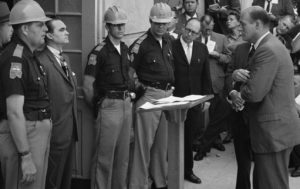 Jun 11: Alabama Governor stands at the door of the University of Alabama in an attempt to block James Hood and Vivian Malone from enrolling. He steps aside after the Alabama National Guard is federalized, and Hood and Malone are enrolled.
Jun 11: Alabama Governor stands at the door of the University of Alabama in an attempt to block James Hood and Vivian Malone from enrolling. He steps aside after the Alabama National Guard is federalized, and Hood and Malone are enrolled.
![]() Jun 11: Hours after the University of Alabama is finally integrated, President John F. Kennedy broadcasts his historic Civil Rights Address, in which he lays out a case for Congress to enact the civil rights bill. “When Americans are sent to Vietnam or West Berlin, we do not ask for whites only,” he says. “It ought to be possible, therefore, for American students of any color to attend any public institution they select without having to be backed up by federal troops. In short, every American ought to be have the right to be treated as he would wish to be treated, as one would wish his children to be treated. But that is not the case.” He declares that the U.S. is facing “a moral crisis as a country and as a people.”
Jun 11: Hours after the University of Alabama is finally integrated, President John F. Kennedy broadcasts his historic Civil Rights Address, in which he lays out a case for Congress to enact the civil rights bill. “When Americans are sent to Vietnam or West Berlin, we do not ask for whites only,” he says. “It ought to be possible, therefore, for American students of any color to attend any public institution they select without having to be backed up by federal troops. In short, every American ought to be have the right to be treated as he would wish to be treated, as one would wish his children to be treated. But that is not the case.” He declares that the U.S. is facing “a moral crisis as a country and as a people.”
![]() Jun 12: Just hours after President John F. Kennedy’s nationally-televised Civil Rights Address, civil rights activist Medgar Evers returns home from a NAACP meeting and is shot and killed in his driveway in Jackson, Mississippi. The bullet passes into his back, through his body, then through a window in the house, piercing a kitchen wall and hitting a refrigerator. Police find it on the counter near the sink. His wife and children witness his shooting. He is rushed to University Hospital, which initially refuses to treat him because of his race. He is finally admitted after his family explains who he is. His last act is to integrate a previously all-white hospital, where he dies 50 minutes later. All-white juries will refuse to convict Evers’s assassin, Byron De La Beckwith. He will finally be convicted in 1994, more than thirty years later, and sentenced to life imprisonment.
Jun 12: Just hours after President John F. Kennedy’s nationally-televised Civil Rights Address, civil rights activist Medgar Evers returns home from a NAACP meeting and is shot and killed in his driveway in Jackson, Mississippi. The bullet passes into his back, through his body, then through a window in the house, piercing a kitchen wall and hitting a refrigerator. Police find it on the counter near the sink. His wife and children witness his shooting. He is rushed to University Hospital, which initially refuses to treat him because of his race. He is finally admitted after his family explains who he is. His last act is to integrate a previously all-white hospital, where he dies 50 minutes later. All-white juries will refuse to convict Evers’s assassin, Byron De La Beckwith. He will finally be convicted in 1994, more than thirty years later, and sentenced to life imprisonment.
![]() Jun 12: Fourteen African-American ministers are arrested while trying to march to Jackson, Mississippi, City Hall following a prayer meeting in memory of Medgar Evers. They are stopped two blocks form the church and arrested for parading without a permit. Later, Jackson police arrest about 146 Africa-Americans attempting a second march from NAACP offices, where Medgar Evers worked.
Jun 12: Fourteen African-American ministers are arrested while trying to march to Jackson, Mississippi, City Hall following a prayer meeting in memory of Medgar Evers. They are stopped two blocks form the church and arrested for parading without a permit. Later, Jackson police arrest about 146 Africa-Americans attempting a second march from NAACP offices, where Medgar Evers worked.
![]() Jun 12: The film Cleopatra premieres at the Rivoli Theater in New York City. The lavish production nearly bankrupts Twentieth Century Fox.
Jun 12: The film Cleopatra premieres at the Rivoli Theater in New York City. The lavish production nearly bankrupts Twentieth Century Fox.
![]()
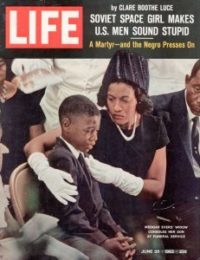 Jun 15: The funeral for Medgar Evers is held in Jackson, Mississippi at the Masonic auditorium. Rev. Roy Wilkins, New York secretary for the NAACP, leads the funeral services, with Martin Luther King and comedian Dick Gregory in attendance. Afterwards, about 4,000 mourners march in 100-degree for 17 blocks behind the hearse carrying the body of Medgar Evers. The mourners march from the auditorium back to the funeral home where Evers’s body will be prepared for burial in Arlington National Cemetery.
Jun 15: The funeral for Medgar Evers is held in Jackson, Mississippi at the Masonic auditorium. Rev. Roy Wilkins, New York secretary for the NAACP, leads the funeral services, with Martin Luther King and comedian Dick Gregory in attendance. Afterwards, about 4,000 mourners march in 100-degree for 17 blocks behind the hearse carrying the body of Medgar Evers. The mourners march from the auditorium back to the funeral home where Evers’s body will be prepared for burial in Arlington National Cemetery.
![]()
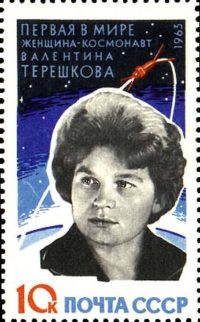 Jun 16: Soviet cosmonaut Valentina Tereshkova becomes the first woman in space as a cosmonaut on Vostok 6.
Jun 16: Soviet cosmonaut Valentina Tereshkova becomes the first woman in space as a cosmonaut on Vostok 6.
![]() Jun 16: David Ben-Gurion, Israeli Prime Minister since the country’s independence since 1948, resigns for “personal reasons.”
Jun 16: David Ben-Gurion, Israeli Prime Minister since the country’s independence since 1948, resigns for “personal reasons.”
![]() Jun 17: In Abington School District v. Schempp, the U.S. Supreme Court rules that state-mandated Bible readings in public schools are unconstitutional.
Jun 17: In Abington School District v. Schempp, the U.S. Supreme Court rules that state-mandated Bible readings in public schools are unconstitutional.
![]() Jun 18: Civil rights activist Dr. Robert Hayling, a St. Augustine, Florida, dentist and leader of the local NAACP, warns that members of the black community may need to abandon passive resistance methods while they focus on self-defense. This statement comes in the wake of numerous shootings and threats by local Klansmen and other extremists. Hayling says that his group will meet “intimidation and acts of violence with all necessary self-defense. I and other leaders of the NAACP have armed ourselves … Since we have tried to negotiate, we have received threatening telephone calls and intimidation. We are not going to die like Evers.”
Jun 18: Civil rights activist Dr. Robert Hayling, a St. Augustine, Florida, dentist and leader of the local NAACP, warns that members of the black community may need to abandon passive resistance methods while they focus on self-defense. This statement comes in the wake of numerous shootings and threats by local Klansmen and other extremists. Hayling says that his group will meet “intimidation and acts of violence with all necessary self-defense. I and other leaders of the NAACP have armed ourselves … Since we have tried to negotiate, we have received threatening telephone calls and intimidation. We are not going to die like Evers.”
![]() Jun 19: Medgar Evers, a World War II veteran who took part in the Normandy invasion, is buried with full military honors at Arlington National Cemetery.
Jun 19: Medgar Evers, a World War II veteran who took part in the Normandy invasion, is buried with full military honors at Arlington National Cemetery.
![]() Jun 19: The Birmingham, Alabama, Parks and Recreation Board votes to reopen the city’s golf courses on a desegregated basis.
Jun 19: The Birmingham, Alabama, Parks and Recreation Board votes to reopen the city’s golf courses on a desegregated basis.
![]() Jun 21: Pope Paul VI succeeds Pope John XXIII.
Jun 21: Pope Paul VI succeeds Pope John XXIII.
![]()
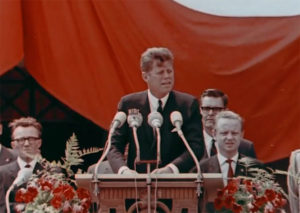 Jun 26: John F. Kennedy declares “Ich bin ein Berliner” before a crowd of 450,000 at the Berlin Wall in West Berlin.
Jun 26: John F. Kennedy declares “Ich bin ein Berliner” before a crowd of 450,000 at the Berlin Wall in West Berlin.
| ◄ | July | ► | ▲ | |||
|---|---|---|---|---|---|---|
| 1 | 2 | 3 | 4 | 5 | 6 | |
| 7 | 8 | 9 | 10 | 11 | 12 | 13 |
| 14 | 15 | 16 | 17 | 18 | 19 | 20 |
| 21 | 22 | 23 | 24 | 25 | 26 | 27 |
| 28 | 29 | 30 | 31 | |||
![]() Jul 1: Roddy Bottom, American composer and keyboardist for Faith No More, is born.
Jul 1: Roddy Bottom, American composer and keyboardist for Faith No More, is born.
![]() Jul 10: A federal judge orders the all-white University of South Carolina to admit its first African-American student, Henrie Monteith. On the same day, the same judge orders the desegregation of all of South Carolina’s 26 state parks.
Jul 10: A federal judge orders the all-white University of South Carolina to admit its first African-American student, Henrie Monteith. On the same day, the same judge orders the desegregation of all of South Carolina’s 26 state parks.
![]() Jul 17: American Psychological Association Refuses To Meet With Gay Rights Group. In 1963, the American Psychological Association was preparing to meet in Philadelphia for their annual convention. Leading gay activists, under the banner of the newly-formed East Coast Homophile Organizations (ECHO) also planned to meet in Philadelphia at the same time, and they proposed a meeting with members of the APA. But the APA convention’s organizing committee declined the invitation, saying “it was not in the best interests of the APA to meet with you, nor to publicize your meetings.”
Jul 17: American Psychological Association Refuses To Meet With Gay Rights Group. In 1963, the American Psychological Association was preparing to meet in Philadelphia for their annual convention. Leading gay activists, under the banner of the newly-formed East Coast Homophile Organizations (ECHO) also planned to meet in Philadelphia at the same time, and they proposed a meeting with members of the APA. But the APA convention’s organizing committee declined the invitation, saying “it was not in the best interests of the APA to meet with you, nor to publicize your meetings.”
![]()
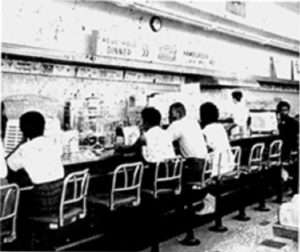 Jul 19: Nine black teens and seven juveniles walk into a Woolworth’s in St. Augustine, Florida and sit at a segregated lunch counter.All but one are arrested. County Judge Charles Mathos, Jr., orders the seven “delinquent children” to spend the night in jail unless their parents promise to make sure they don’t participate in any more demonstration, Five days later, four of of the demonstrators, Audrey Nell Edwards, JoeAnn Anderson, Willie Carl Singleton and Samuel White, decide on their own to refuse the judge’s conditions and remain in jail. The four will be sent to reform school, where they will be held until the following January.
Jul 19: Nine black teens and seven juveniles walk into a Woolworth’s in St. Augustine, Florida and sit at a segregated lunch counter.All but one are arrested. County Judge Charles Mathos, Jr., orders the seven “delinquent children” to spend the night in jail unless their parents promise to make sure they don’t participate in any more demonstration, Five days later, four of of the demonstrators, Audrey Nell Edwards, JoeAnn Anderson, Willie Carl Singleton and Samuel White, decide on their own to refuse the judge’s conditions and remain in jail. The four will be sent to reform school, where they will be held until the following January.
![]() Jul 25: Representatives of the U.S., U.K., and the Soviet Union initial the Partial Nuclear Test Ban Treating. The agreement will ban nuclear tests in the atmosphere, outer space and under water.
Jul 25: Representatives of the U.S., U.K., and the Soviet Union initial the Partial Nuclear Test Ban Treating. The agreement will ban nuclear tests in the atmosphere, outer space and under water.
![]() Jul 30: The Soviet newspaper Izvestia reports that British diplomat and Soviet double-agent Kim Philby had been given asylum in Moscow.
Jul 30: The Soviet newspaper Izvestia reports that British diplomat and Soviet double-agent Kim Philby had been given asylum in Moscow.
| ◄ | August | ► | ▲ | |||
|---|---|---|---|---|---|---|
| 1 | 2 | 3 | ||||
| 4 | 5 | 6 | 7 | 8 | 9 | 10 |
| 11 | 12 | 13 | 14 | 15 | 16 | 17 |
| 18 | 19 | 20 | 21 | 22 | 23 | 24 |
| 25 | 26 | 27 | 28 | 29 | 30 | 31 |
![]() Aug 8: The Great Train Robbery takes place in Buckinghamshire, England when a gang of sixteen men attack a Royal Mail train going from Glasgow to London and get away with £2.6 million (£49.1 million today).
Aug 8: The Great Train Robbery takes place in Buckinghamshire, England when a gang of sixteen men attack a Royal Mail train going from Glasgow to London and get away with £2.6 million (£49.1 million today).
![]() Aug 9: Patrick Bouvier Kennedy, infant son of John and Jacqueline Kennedy, dies two days after being delivered in an emergency c-section. He had been born 5½ weeks premature, and weighed 4 pounds, 10½ ounces. Within minutes, he had breathing difficulties, suffering from what is now known as infant respiratory distress syndrome. He lived 39 hours and 12 minutes.
Aug 9: Patrick Bouvier Kennedy, infant son of John and Jacqueline Kennedy, dies two days after being delivered in an emergency c-section. He had been born 5½ weeks premature, and weighed 4 pounds, 10½ ounces. Within minutes, he had breathing difficulties, suffering from what is now known as infant respiratory distress syndrome. He lived 39 hours and 12 minutes.
![]() Aug 10: English author, columnist and former blogger Andrew Sullivan is born.
Aug 10: English author, columnist and former blogger Andrew Sullivan is born.
![]() Aug 18: James Meredith becomes the first African-American to graduate from the University of Mississippi, earning a BA in political science with a minor in French. His graduation day goes off without incident.
Aug 18: James Meredith becomes the first African-American to graduate from the University of Mississippi, earning a BA in political science with a minor in French. His graduation day goes off without incident.
![]() Aug 21: The South Vietnamese army, under orders of the Catholic President Ngô Đình Diệm, arrest thousands of Buddhist monks and nuns, and vandalize pagodas across South Vietnam.
Aug 21: The South Vietnamese army, under orders of the Catholic President Ngô Đình Diệm, arrest thousands of Buddhist monks and nuns, and vandalize pagodas across South Vietnam.
![]() Aug 27: American civil rights activist W.E.B. Du Bois dies in Accra, Ghana, at the age of 95.
Aug 27: American civil rights activist W.E.B. Du Bois dies in Accra, Ghana, at the age of 95.
![]()
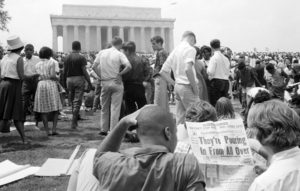 Aug 28: Martin Luther King, Jr., delivers his “I Have a Dream” speech on the steps of the Lincoln Memorial before a crowd of more than 250,000 during the March on Washington for Jobs and Freedom.
Aug 28: Martin Luther King, Jr., delivers his “I Have a Dream” speech on the steps of the Lincoln Memorial before a crowd of more than 250,000 during the March on Washington for Jobs and Freedom.
| ◄ | September | ► | ▲ | |||
|---|---|---|---|---|---|---|
| 1 | 2 | 3 | 4 | 5 | 6 | 7 |
| 8 | 9 | 10 | 11 | 12 | 13 | 14 |
| 15 | 16 | 17 | 18 | 19 | 20 | 21 |
| 22 | 23 | 24 | 25 | 26 | 27 | 28 |
| 29 | 30 | |||||
![]()
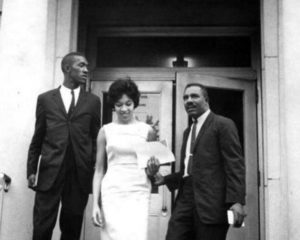 Sep 11: The University of South Carolina admits its first three African-American students. USC officials turn to a playbook similar to the one used by Clemson when Harvey Gantt enrolled there on January 28. USC and state officials and business leaders spent months of planning in order to ensure that the enrollment of James Solomon, Henrie Monteith and Robert Anderson go forward with a minimum of outside attention and controversy.
Sep 11: The University of South Carolina admits its first three African-American students. USC officials turn to a playbook similar to the one used by Clemson when Harvey Gantt enrolled there on January 28. USC and state officials and business leaders spent months of planning in order to ensure that the enrollment of James Solomon, Henrie Monteith and Robert Anderson go forward with a minimum of outside attention and controversy.
![]()
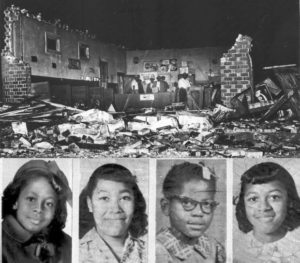 Sep 15. Four black schoolgirls are killed in the 16th Street Baptist Church bombing in Birmingham, Alabama. Twenty-two more children attending a Sunday school class are injured. Four KKK members planted at least 15 sticks of dynamite attached to a timer under the church’s front steps. At 10:22 a.m., an anonymous caller phones the church and says simply, “Three minutes.” Less than a minute later, the bomb explodes, killing Denise McNair, 11, Carole Robertson, 14, Addie Mae Collins, 14, and Cynthia Wesley, 14. None of the four Klan members — Thomas Edwin Blanton Jr., Herman Frank Cash, Robert Edward Chambliss and Bobby Frank Cherry — will be brought to justice until 1977, when Chambliss is convicted of murder and sentenced to life imprisonment. Blanton and Cherry will be convicted in 2001 and 2002 and sentenced to life as well. Cash will die in 1974 before charges are brought. The 16th Street Baptist Church bombing is the most prominent of a string of 50 bombings taking place in the city between 1947 and 1965, which earned the city the nickname “Bombingham.”
Sep 15. Four black schoolgirls are killed in the 16th Street Baptist Church bombing in Birmingham, Alabama. Twenty-two more children attending a Sunday school class are injured. Four KKK members planted at least 15 sticks of dynamite attached to a timer under the church’s front steps. At 10:22 a.m., an anonymous caller phones the church and says simply, “Three minutes.” Less than a minute later, the bomb explodes, killing Denise McNair, 11, Carole Robertson, 14, Addie Mae Collins, 14, and Cynthia Wesley, 14. None of the four Klan members — Thomas Edwin Blanton Jr., Herman Frank Cash, Robert Edward Chambliss and Bobby Frank Cherry — will be brought to justice until 1977, when Chambliss is convicted of murder and sentenced to life imprisonment. Blanton and Cherry will be convicted in 2001 and 2002 and sentenced to life as well. Cash will die in 1974 before charges are brought. The 16th Street Baptist Church bombing is the most prominent of a string of 50 bombings taking place in the city between 1947 and 1965, which earned the city the nickname “Bombingham.”
![]() Sep 16: The science fiction anthology series The Outer Limits premieres on ABC.
Sep 16: The science fiction anthology series The Outer Limits premieres on ABC.
![]()
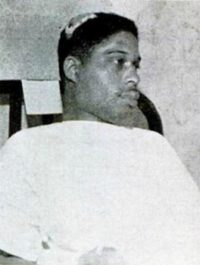 Sep 18: A Klan group in St. Augustine, Florida, blankets the city with leaflets advertising a big rally outside of town. Local civil rights activist Dr. Robert Hayling and three other men drive out on a back road hoping to spy on the rally. Instead, they are caught and dragged into the middle of the cross burning. Klansmen beat them with chains and wrenches. When the Klan realizes that Hayling, a dentist, is one of the four, they make sure to break his hand and knock out eleven teeth. The four are threatened with castration and being burned alive when the sheriff shows up. The sheriff was tipped off by a white minister taking part in the rally, but who slipped away to call the sheriff. Four Klansmen are charged, but they will be acquitted. Bizarrely, Hayling will be charged, convicted of assault by an all-white jury, and fined $100 (about $850 today).
Sep 18: A Klan group in St. Augustine, Florida, blankets the city with leaflets advertising a big rally outside of town. Local civil rights activist Dr. Robert Hayling and three other men drive out on a back road hoping to spy on the rally. Instead, they are caught and dragged into the middle of the cross burning. Klansmen beat them with chains and wrenches. When the Klan realizes that Hayling, a dentist, is one of the four, they make sure to break his hand and knock out eleven teeth. The four are threatened with castration and being burned alive when the sheriff shows up. The sheriff was tipped off by a white minister taking part in the rally, but who slipped away to call the sheriff. Four Klansmen are charged, but they will be acquitted. Bizarrely, Hayling will be charged, convicted of assault by an all-white jury, and fined $100 (about $850 today).
![]() Sep 22: A demonstration, drawing about ten thousand people, is held at Foley Square, New York City, outside the United States Court House, is held for the National Day of Mourning for the Children of Birmingham. The demonstration is sponsored by the NAACP, Congress of Racial Equality, and Students Non-Violent Coordinating Committee. Among the speakesr are Rev. Richard Hilderbrand, Bayard Rustin, James Baldwin, and Norm Thomas.
Sep 22: A demonstration, drawing about ten thousand people, is held at Foley Square, New York City, outside the United States Court House, is held for the National Day of Mourning for the Children of Birmingham. The demonstration is sponsored by the NAACP, Congress of Racial Equality, and Students Non-Violent Coordinating Committee. Among the speakesr are Rev. Richard Hilderbrand, Bayard Rustin, James Baldwin, and Norm Thomas.
![]() Sep 24: The U.S. Senate ratifies the Nuclear Test Ban Treaty.
Sep 24: The U.S. Senate ratifies the Nuclear Test Ban Treaty.
![]() Sep 24: Petticoat Junction and The Judy Garland Show premiere on CBS.
Sep 24: Petticoat Junction and The Judy Garland Show premiere on CBS.
| ◄ | October | ► | ▲ | |||
|---|---|---|---|---|---|---|
| 1 | 2 | 3 | 4 | 5 | ||
| 6 | 7 | 8 | 9 | 10 | 11 | 12 |
| 13 | 14 | 15 | 16 | 17 | 18 | 19 |
| 20 | 21 | 22 | 23 | 25 | 25 | 26 |
| 27 | 28 | 29 | 30 | 31 | ||
![]() Oct 1: The film Lilies of the Field is released.
Oct 1: The film Lilies of the Field is released.
![]() Oct 2: The White House announces that the withdrawal of 15,000 American troops from South Vietnam could be complete by the end of 1965.
Oct 2: The White House announces that the withdrawal of 15,000 American troops from South Vietnam could be complete by the end of 1965.
![]() Oct 8: Sam Cooke and his band are arrested after trying to register at a “whites only” motel in Shreveport, Louisiana. The hotel had initially accepted his reservation. Two months later, Cooke will record the protest anthem, “A Change Is Gonna Come.”
Oct 8: Sam Cooke and his band are arrested after trying to register at a “whites only” motel in Shreveport, Louisiana. The hotel had initially accepted his reservation. Two months later, Cooke will record the protest anthem, “A Change Is Gonna Come.”
![]() Oct 10: Édith Piaf, French singer and actress, dies at the age of 47. She is denied a funeral Mass by Cardinal Maurice Feltin because of her “lifestyle.” Her last words were, “Every damn thing you do in this life, you have to pay for.”
Oct 10: Édith Piaf, French singer and actress, dies at the age of 47. She is denied a funeral Mass by Cardinal Maurice Feltin because of her “lifestyle.” Her last words were, “Every damn thing you do in this life, you have to pay for.”
![]() Oct 11: Jean Cocteau, French writer, filmmaker, and close personal friend of Édith Piaf, dies of a heart attack at the age of 74, soon after learning of Piaf’s death.
Oct 11: Jean Cocteau, French writer, filmmaker, and close personal friend of Édith Piaf, dies of a heart attack at the age of 74, soon after learning of Piaf’s death.
![]() Oct 12: Jimmy Golmer and the Fireballs’ single “Sugar Shack” begins its five week run at the top of the charts.
Oct 12: Jimmy Golmer and the Fireballs’ single “Sugar Shack” begins its five week run at the top of the charts.
![]() Oct 28: Two carloads of white men drive through African-American neighborhoods of St. Augustine, Florida, blasting home and night clubs with rifles and shotguns. The men apparently throw a live grenade onto a night club, but it fails to explode. Only one injury is reported; a man’s finger was hit by a shotgun pellet when the white men fired on his home.
Oct 28: Two carloads of white men drive through African-American neighborhoods of St. Augustine, Florida, blasting home and night clubs with rifles and shotguns. The men apparently throw a live grenade onto a night club, but it fails to explode. Only one injury is reported; a man’s finger was hit by a shotgun pellet when the white men fired on his home.
![]() Oct 28: Demolition of New York’s historic Penn Station begins. It will take three years to demolish the landmark structure.
Oct 28: Demolition of New York’s historic Penn Station begins. It will take three years to demolish the landmark structure.
| ◄ | November | ► | ▲ | |||
|---|---|---|---|---|---|---|
| 1 | 2 | |||||
| 3 | 4 | 5 | 6 | 7 | 8 | 9 |
| 10 | 11 | 12 | 13 | 14 | 15 | 15 |
| 17 | 18 | 19 | 20 | 21 | 22 | 23 |
| 24 | 25 | 26 | 27 | 28 | 20 | 30 |
![]()
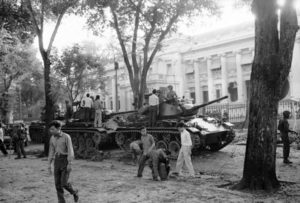 Nov 1: Three South Vietnam marine battalions seize Saigon’s radio stations, police stations and telephone exchanges in the first steps of a coup d’état against President Ngô Đình Diệm and his brother, Ngô Đình Nhu. Nhu has no official power, but he commands private armies and a secret police. The Ngô brothers escape the Presidential palace at around 8:00 p.m.
Nov 1: Three South Vietnam marine battalions seize Saigon’s radio stations, police stations and telephone exchanges in the first steps of a coup d’état against President Ngô Đình Diệm and his brother, Ngô Đình Nhu. Nhu has no official power, but he commands private armies and a secret police. The Ngô brothers escape the Presidential palace at around 8:00 p.m.
![]()
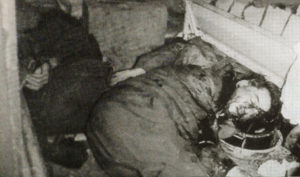 Nov 2. South Vietnamese President Ngô Đình Diệm and his brother, Ngô Đình Nhu are arrested and assassinated in a coup. Four days later, Coup leader General Dương Văn Minh will take over as head of a junta that will rule South Vietnam for the next two years.
Nov 2. South Vietnamese President Ngô Đình Diệm and his brother, Ngô Đình Nhu are arrested and assassinated in a coup. Four days later, Coup leader General Dương Văn Minh will take over as head of a junta that will rule South Vietnam for the next two years.
![]() Nov 2: Peter, Paul and Mary’s album In the Wind begins its five week run at the top of the album charts. The album features two Bob Dylan songs: “Blowin’ In the Wind” and “Don’t Think Twice, It’s All Right.”
Nov 2: Peter, Paul and Mary’s album In the Wind begins its five week run at the top of the album charts. The album features two Bob Dylan songs: “Blowin’ In the Wind” and “Don’t Think Twice, It’s All Right.”
![]() Nov 7: The classic comedy film It’s a Mad, Mad, Mad, Mad World is released
Nov 7: The classic comedy film It’s a Mad, Mad, Mad, Mad World is released
![]()
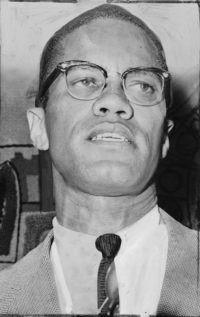 Nov 10: Malcolm X delivers his “Message to the Grass Roots” at the Northern Negro Leadership Conference in Detroit, Michigan. The message is one of radical revolution rather than peaceful nonviolence and accommodation. “You don’t catch hell ’cause you’re a Methodist or Baptist… a Democrat or a Republican… a Mason or an Elk,” Malcolm says. “And you sure don’t catch hell ’cause you’re an American; ’cause if you was an American, you wouldn’t catch no hell. You catch hell ’cause you’re a black man. You catch hell, all of us catch hell, for the same reason.” He also criticizes Dr. Martin Luther King, Jr., and other more moderate black leaders who he accuses to selling out. He describes the peaceful March on Washington as “nothing but a circus, with clowns and all … white and black clowns.”
Nov 10: Malcolm X delivers his “Message to the Grass Roots” at the Northern Negro Leadership Conference in Detroit, Michigan. The message is one of radical revolution rather than peaceful nonviolence and accommodation. “You don’t catch hell ’cause you’re a Methodist or Baptist… a Democrat or a Republican… a Mason or an Elk,” Malcolm says. “And you sure don’t catch hell ’cause you’re an American; ’cause if you was an American, you wouldn’t catch no hell. You catch hell ’cause you’re a black man. You catch hell, all of us catch hell, for the same reason.” He also criticizes Dr. Martin Luther King, Jr., and other more moderate black leaders who he accuses to selling out. He describes the peaceful March on Washington as “nothing but a circus, with clowns and all … white and black clowns.”
![]() Nov 10: An American version of the British news satire That Was the Week That Was premiers on NBC.
Nov 10: An American version of the British news satire That Was the Week That Was premiers on NBC.
![]()
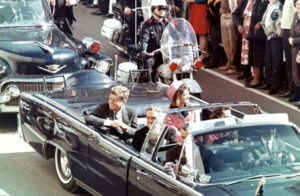 Nov 22: John F. Kennedy is assassinated by Lee Harvey Oswald. in downtown Dallas, Texas. Texas Gov. John Connolly is injured. Immediately after the shooting, Oswald leaves his perch on the sixth floor of the Texas Schoolbook Depository and flees on foot to the Oak Cliff neighborhood. He shoots Dallas Police officer J.D. Tippit when Tippit approaches Oswald after hearing Oswald’s description over the police radio. Oswald ducks inside the Texas Theatre, where police arrest him. Meanwhile, Kennedy is rushed to Parkland hospital, and is pronounced dead a short time later. Vice president Lyndon Johnson is sworn in as President on board of Air Force One at Love Field with former First Lady Jacqueline Kennedy at his side, still wearing the blood-stained dress.
Nov 22: John F. Kennedy is assassinated by Lee Harvey Oswald. in downtown Dallas, Texas. Texas Gov. John Connolly is injured. Immediately after the shooting, Oswald leaves his perch on the sixth floor of the Texas Schoolbook Depository and flees on foot to the Oak Cliff neighborhood. He shoots Dallas Police officer J.D. Tippit when Tippit approaches Oswald after hearing Oswald’s description over the police radio. Oswald ducks inside the Texas Theatre, where police arrest him. Meanwhile, Kennedy is rushed to Parkland hospital, and is pronounced dead a short time later. Vice president Lyndon Johnson is sworn in as President on board of Air Force One at Love Field with former First Lady Jacqueline Kennedy at his side, still wearing the blood-stained dress.
![]() Nov 23: The first episode of Dr. Who is broadcast on the BBC.
Nov 23: The first episode of Dr. Who is broadcast on the BBC.
![]() Nov 24: Lee Harvey Oswald is shot in the abdomen at point-blank range by Jack Ruby at the Dallas police headquarters. Oswald is shot while being escorted through the basement garage to an armored car to take him to Dallas County jail. The shooting occurs during a live NBC television broadcast, with millions of Americans watching. Oswald is rushed to Parkland Hospital — the same hospital where Kennedy was pronounced dead two days earlier. Oswald dies at 1:07 p.m. Central Time.
Nov 24: Lee Harvey Oswald is shot in the abdomen at point-blank range by Jack Ruby at the Dallas police headquarters. Oswald is shot while being escorted through the basement garage to an armored car to take him to Dallas County jail. The shooting occurs during a live NBC television broadcast, with millions of Americans watching. Oswald is rushed to Parkland Hospital — the same hospital where Kennedy was pronounced dead two days earlier. Oswald dies at 1:07 p.m. Central Time.
![]()
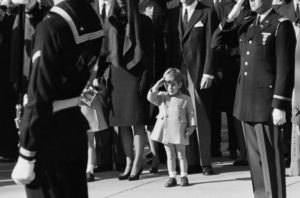 Nov 25: John F. Kennedy is buried in Arlington National Cemetery following a state funeral. Millions around the world watch the funeral on live television. Las Vegas closes all of its casinos for the day, and telephone service is halted in the U.S. for one minute at noon Eastern Times.
Nov 25: John F. Kennedy is buried in Arlington National Cemetery following a state funeral. Millions around the world watch the funeral on live television. Las Vegas closes all of its casinos for the day, and telephone service is halted in the U.S. for one minute at noon Eastern Times.
![]() Nov 26: Regularly-scheduled television programming resumes in the U.S. with Captain Kangaroo on CBS at 8:00 a.m.
Nov 26: Regularly-scheduled television programming resumes in the U.S. with Captain Kangaroo on CBS at 8:00 a.m.
![]() Nov 26: Jack Ruby is formally indicted by a Dallas County grand jury for the murder of Lee Harvey Oswald.
Nov 26: Jack Ruby is formally indicted by a Dallas County grand jury for the murder of Lee Harvey Oswald.
![]() Nov 26: Big Butte School in Butte, Montana, is renamed “John F. Kennedy Elementary School” by a unanimous vote of the school board. It is the first of about 1,000 schools to be renamed in the late President’s honor.
Nov 26: Big Butte School in Butte, Montana, is renamed “John F. Kennedy Elementary School” by a unanimous vote of the school board. It is the first of about 1,000 schools to be renamed in the late President’s honor.
![]()
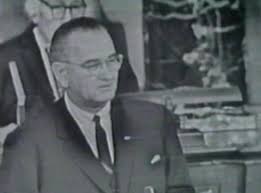 Nov 27: President Lyndon B. Johnson speaks before a joint session of Congress and urges the body to continue the late President’s program and pass legislation for a tax cut and, especially, a civil rights bill. “No memorial oration or eulogy could more eloquently honor President Kennedy’s memory,” he says, “than the earliest possible passage of the civil rights bill for which he fought so long.” Reminding Congress that Kennedy’s inaugural address was built on the theme of “Let us begin,” Johnson urges Congress, “let us continue … Let us here highly resolve that John Fitzgerald Kennedy did not live — or die — in vain.”
Nov 27: President Lyndon B. Johnson speaks before a joint session of Congress and urges the body to continue the late President’s program and pass legislation for a tax cut and, especially, a civil rights bill. “No memorial oration or eulogy could more eloquently honor President Kennedy’s memory,” he says, “than the earliest possible passage of the civil rights bill for which he fought so long.” Reminding Congress that Kennedy’s inaugural address was built on the theme of “Let us begin,” Johnson urges Congress, “let us continue … Let us here highly resolve that John Fitzgerald Kennedy did not live — or die — in vain.”
![]() Nov 28: On Thanksgiving Day, President Johnson issues an Executive Order renaming Cape Canaveral, Florida, to Cape Kennedy.
Nov 28: On Thanksgiving Day, President Johnson issues an Executive Order renaming Cape Canaveral, Florida, to Cape Kennedy.
![]() Nov 29: President Lyndon Johnson establishes the Warren Commission to investigate the Kennedy assassination.
Nov 29: President Lyndon Johnson establishes the Warren Commission to investigate the Kennedy assassination.
| ◄ | December | ▲ | ||||
|---|---|---|---|---|---|---|
| 1 | 2 | 3 | 4 | 5 | 6 | 7 |
| 8 | 9 | 10 | 11 | 12 | 13 | 14 |
| 15 | 16 | 17 | 18 | 19 | 20 | 21 |
| 22 | 23 | 24 | 25 | 26 | 27 | 28 |
| 29 | 30 | 31 | ||||
![]() Dec 7: Soeur Suorire’s single “Dominique” begins its four week run at the top of the charts. At the same time, her album, titled The Singing Nun begins its ten week run at the top of the album charts.
Dec 7: Soeur Suorire’s single “Dominique” begins its four week run at the top of the charts. At the same time, her album, titled The Singing Nun begins its ten week run at the top of the album charts.
![]() Dec 14: Jazz/blues singer Dinah Washington dies in her sleep at the age of 39. Her death is due to an accidental overdose of prescription medications for dieting and insomnia.
Dec 14: Jazz/blues singer Dinah Washington dies in her sleep at the age of 39. Her death is due to an accidental overdose of prescription medications for dieting and insomnia.
![]() Dec 19: The film The Pink Panther is released in West Germany. It will be released in the United States on March 20.
Dec 19: The film The Pink Panther is released in West Germany. It will be released in the United States on March 20.
![]() Dec 26: The Beatles’ single “I Wanna Hold Your Hand” b/w “I Saw Her Standing There,” is released in the United States. A quarter million copies are sold in the first three days. The single goes to number one and stays there for 7 weeks.
Dec 26: The Beatles’ single “I Wanna Hold Your Hand” b/w “I Saw Her Standing There,” is released in the United States. A quarter million copies are sold in the first three days. The single goes to number one and stays there for 7 weeks.
![[Emphasis Mine]](http://jimburroway.com/wp-content/uploads/2018/01/RainbowWhiteHouse.jpg)